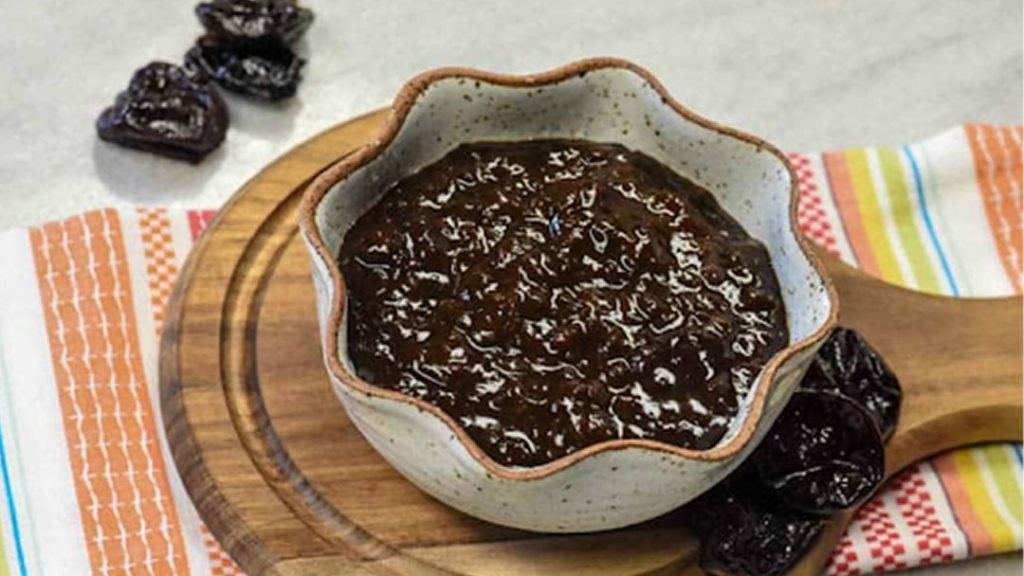Last Updated on April 11, 2022 by Ray
If you didn’t already know this, you might be in for an unpleasant surprise. When you first introduce your infant to solid foods, they may become constipated. Until their bodies become adjusted to solid foods, they may experience some blockage for a brief time.
But there’s mom’s help. Prunes may be just the thing to rescue your sweet baby’s digestive issues and taste great to boot. At around six months old, your baby is ready for more than milk (if that’s your choice), and prunes can be among their first foods.
Related: Baby Allergies: Symptoms & How Mothers Can Help
Are Prunes Healthy for Baby?
Prunes are, of course, dried plums. They have a rich tart concentrated flavor, sticky to touch, and a stone in the middle. Most prunes that you’ll see in your local grocery store are probably from California or France. Not all prunes fit this description. Some prunes from other parts of the world are salty and tangy or sweet and sour.
The question is, is prune healthy for babies? The answer is yes, but in moderation. This fiber-rich, nutritionally dense fruit contains plenty of protein, potassium, vitamins, and antioxidants. They also offer many health benefits for your baby or anyone else who consumes them.
Here are some of the health benefits for a baby:
Helps Digestion
Due to the high sorbitol content, prunes can relieve constipation and help with digestion. Six prunes have 4 g of dietary fiber.
Babies up to 11 months old only need 10 g (½ tablespoon) of fiber each day, but as they grow, their needs increase. By the time they’re 1 to 3 years old, they will need 16 g (1 full tablespoon) of fiber a day. Again, prunes are a high-fiber fruit.
Maintains Organ Health
Prunes are high in potassium and vitamin A. Vitamin A helps with eye health, and potassium, as an electrolyte, helps maintain your baby’s heart rate, digestive processes, muscle contractions, and blood pressure.
Prevents Anemia
Anemia is the condition of having fewer red blood cells than the standard threshold. An anemic person’s body has trouble producing enough red blood cells. One of the most common kinds of anemia among babies is iron differentiation anemia, which means they lack iron in the blood. Prunes are high in iron, and if consumed regularly, may prevent anemia in infants.
Stronger Bones and Teeth
Dried prunes contain Boron, a mineral that strengthens bones and muscles. In addition to preventing bone density loss, prune fruit may even improve muscle coordination.
Are you a new mother trying to balance work and family? We can help you navigate through this challenging time. Check out Ray of Solace for more information.
Nutritional Profile of Prune Fruit
Just 28 grams of prunes contains:
- Fiber
- Carbohydrate
- Sugar
- Vitamin A
- Vitamin B2, B3, B6
- Vitamin K
- Copper
- Magnesium
- Potassium
- Manganese
- Phosphorus

Can I Give My Baby Prunes Every Day?
Now that you know all the good that prunes can do for your baby, you may now be wondering how often you can give them to your baby. Of course, check with your pediatrician, but if they are okay, you can give your baby prune juice every day. To know how much to give them, try giving 1 ounce for every month of life, with a maximum amount being 4 ounces. And the baby should only have this tasty treat twice per day, maximum.
Related: TED Baby: A Guide for a Worried TED Mama
How to Give Your Baby Prunes
As mentioned earlier, prunes contain a stone, which is a choking hazard until your baby is 12 months old. So, here are a few ways to give your baby prunes:
- Begin with a prune puree (recipe to follow) for young babies as a first food.
- When the baby is a little older, they can eat mashed prunes.
- By about 8 months old, prunes may be cut into small pieces for the baby’s tiny fingers.
- Prunes may be mixed with other foods if your baby doesn’t enjoy the taste at first.
Prune Puree Recipe
Here is a recipe for prune puree:
Ingredients
One bag of organic dried prunes
2 cups of water – enough to cover the prunes in a pan
Method
- Rinse prunes and put them together in a saucepan.
- Cover prunes with water by about an inch.
- Heat on medium flame and bring it to a boil.
- Reduce heat after about 10 minutes and simmer for another 10 minutes.
- Once cooled to room temperature, put boiled prunes into a blender (or you can use an immersion hand blender).
- Blend until smooth.
- The result will be a thick substance. Just let it cool before feeding it to your baby.
Prune Mash Recipe
Here is a recipe for prune mash for a slightly older baby:
Ingredients
10 prunes
Water – as required
Method
- Soak the dried prunes for about 30 minutes until they have softened.
- Or, you can steam the prunes for 10 minutes or until they are soft enough to mash.
- Blend the soft prunes or mash them by hand using the water you used for soaking.
- Alternatively, you may juice the prunes with the same water they were soaked in.
Tips for Buying, Storing, and Feeding Prunes to Your Baby
- Give only a minimal amount at first. You’ll need to monitor how their body reacts as prunes contain a small amount of histamine.
- Buy prunes that are deep purple or blackish color, with firm feeling flesh.
- Avoid prunes that have been dried in sulfur or preserved in any other chemicals.
- Use prunes within one week of purchase.
- Your prune puree will last for 2 – 3 days in the refrigerator.
Related: Weird Pregnancy Cravings? Here’s What They Mean
Other Ways To Support Your Baby’s Digestion
Maybe your baby seems to hate the taste of prunes, or maybe prunes simply don’t seem to speed their digestion along as much as you’d like. Whatever the reason, there are a few other ways to help them through the process.
The first step is to avoid foods that promote constipation, like potatoes, pasta, or bananas, and stick to purees. If they seem averse to prune, puree, you could also try peaches, peas, plums, or pears. You could also give them other purees that are less fiber-rich but still easy to digest, like sweet potatoes and avocado.
The next point to consider is water. Is your baby drinking enough? It may help to give them more water throughout the day in addition to the breast milk or formula they’re already consuming. At about six months, it’s safe to aim for about 4-6 oz per day.
Giving your baby a warm bath can also help smooth things along. A bath can help relax their abdominal muscles enough to relieve their constipation while also alleviating some of the discomfort or pain they may be feeling.
Another great way to encourage their digestion is through various tummy exercises and massages. Movement and exercise can help promote digestion in anyone, but since your baby may not be able to move around too much, you can help them out. For example, while they’re lying on their back, you can take your baby’s legs and move them around in a bicycle motion. Another option is a gentle massage, where you use your fingertips to make a clockwise circular motion on their belly.
Related: New Mom? Mom Coaching Is Here To Help!
The Last Word on Prunes for Babies
If your infant is suffering from constipation or if you just want to introduce a nutrient-rich fruit to their diet, consider prunes. They’re tasty, inexpensive, and easy to prepare. Your baby can enjoy prune puree as a first food, then a mash, a finger food, and finally, they can enjoy the fruit whole – once they’re old enough to avoid choking on the stone.
Are you looking for nurturing life coaching? Coach Ray works to make you happier, healthier, and more successful. Contact Ray of Solace today!
